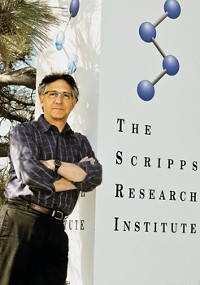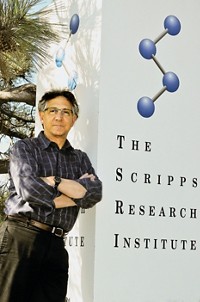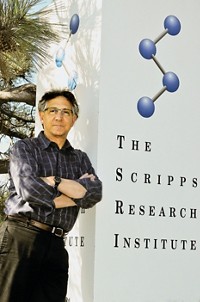Advertisement
Grab your lab coat. Let's get started
Welcome!
Welcome!
Create an account below to get 6 C&EN articles per month, receive newsletters and more - all free.
It seems this is your first time logging in online. Please enter the following information to continue.
As an ACS member you automatically get access to this site. All we need is few more details to create your reading experience.
Not you? Sign in with a different account.
Not you? Sign in with a different account.
ERROR 1
ERROR 1
ERROR 2
ERROR 2
ERROR 2
ERROR 2
ERROR 2
Password and Confirm password must match.
If you have an ACS member number, please enter it here so we can link this account to your membership. (optional)
ERROR 2
ACS values your privacy. By submitting your information, you are gaining access to C&EN and subscribing to our weekly newsletter. We use the information you provide to make your reading experience better, and we will never sell your data to third party members.
Biological Chemistry
Movers And Shakers
Michael Marletta
Incoming Scripps president discusses move to administration, challenges for research institute
by Jyllian Kemsley
December 19, 2011
| A version of this story appeared in
Volume 89, Issue 51

On Jan. 1, 2012, Michael A. Marletta will take the reins as president of Scripps Research Institute, a private, nonprofit research organization focused on biomedical research. Excited to lead the organization, Marletta nonetheless will be challenged to maintain funding for the institute as its traditional sources of money tighten their belts.
Marletta, 60, moves to Scripps after a 30-year academic career that saw him serve as a professor at several universities, most recently in the chemistry department at the University of California, Berkeley.
At Scripps, Marletta succeeds Richard A. Lerner, who served as president for more than two decades. Lerner tried to recruit Marletta to join Scripps’s faculty several times over many years, “but I truly liked being at a big, complicated university,” Marletta says. “I enjoyed the full spectrum of things I was doing, including teaching undergraduates.”
And when he chaired the Berkeley chemistry department, Marletta found that he also enjoyed leading people beyond his lab group. “When I think I know what every day is going to look like, when the challenges in front of me are only ones that I create, that is when I get a little bored,” he says.
After stepping down as department chair in 2010, Marletta started exploring job options in administration, but he had some requirements. One was that he could continue to maintain his lab group and research into the catalytic and biological properties of redox enzymes. “That’s an exciting piece that I can’t imagine doing without,” Marletta says.
The other involved family. His son is in 11th grade, and Marletta didn’t want to move him during his final years of high school. Any organization hiring Marletta had to agree to allow him to commute between work and Berkeley.
Scripps accepted those conditions; Lerner, in fact, has kept a successful research program going while serving as president, and the president’s office connects to adjacent lab space.
Marletta started at Scripps part-time as president-elect on July 1, spending a couple of days a week at Scripps headquarters in La Jolla, Calif., or its second campus in Jupiter, Fla. Come January, his research group will move to La Jolla. Marletta plans to spend weekdays at one of Scripps’s locations and weekends in Berkeley.
As he has gotten to know the Scripps organization and people over the past few months, Marletta says, what has surprised him is how enthusiastic the faculty and staff all seem to be about his arrival. Given Lerner’s long tenure, there has been some uncertainty about what the leadership change may bring, “but it hasn’t taken on any tone of negativity that I’ve seen,” Marletta says.
Marletta’s leadership style is one of inclusion without bureaucracy. He appreciates Scripps’s flat organization and likes to treat meetings “kind of like a group meeting,” he says, with people presenting their latest results or problems and getting input from the crowd on the next steps to take. “I don’t have the market cornered on good ideas,” Marletta says, but “there’s still one person that’s going to make decisions,” he adds.
Looking ahead, Scripps must keep its emphasis on fundamental research to understand biology, with a focus on human health and disease, Marletta says. His challenge will be to ensure the institute has the funding to retain current faculty members and recruit new ones, as well as to provide the instruments and other infrastructure that enable Scripps scientists to do top-notch research.
Scripps has historically had two main streams of funding: federal grant money, principally from the National Institutes of Health, and agreements with pharmaceutical companies that gave Scripps unrestricted funds in exchange for first rights to capitalize on Scripps’s discoveries. Scripps’s budget for 2012 includes about $317 million from grants, $30 million from pharmaceutical companies, and $44 million from other sources, Marletta says.
Just like other federally funded scientists, however, Scripps researchers are affected by government budget cuts, Marletta says. And pharmaceutical companies now want agreements that are more targeted to specific research, he says.
Going forward, Marletta has his eyes on other sources of funding. “Private philanthropy is clearly one of the most important and immediate solutions to our financial stability,” he says, and he has already been meeting with potential donors.
He also aims to focus on improving the return on Scripps’s intellectual property. As agreements with pharmaceutical companies expire and Scripps regains control over when, how, and with what return its discoveries are translated into medical therapies, licensing income “will be an important part of our financial picture,” Marletta says. He acknowledges that the effort will require institutional investments in technology transfer and translational infrastructure.
Marletta says that he’s more excited now about the opportunity to lead Scripps than he was when he learned that he would get the job. “It’s not like everything is wonderful. There are challenges, but that’s why I took the job,” he says. “But the people that I’ve met and how they feel about the place and what they’re doing, that makes my excitement level higher.”





Join the conversation
Contact the reporter
Submit a Letter to the Editor for publication
Engage with us on Twitter